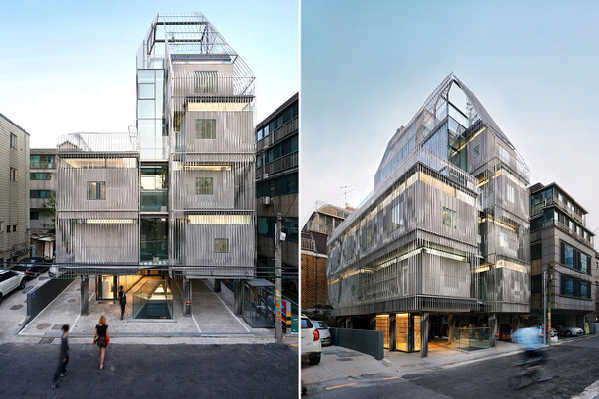當(dāng)前位置: Language Tips> 雙語(yǔ)新聞
The house that breaks up when you do
分享到

As the old song has it, breaking up is hard to do.
正如一首老歌唱的一樣,分手太難。
Not only is there the emotional angst, but in many cases one partner has to pack up and move out.
這困難之處不僅在于情感上的憂慮,在許多情況下情侶中的一方在分手后還需要打包自己的物品搬出共同居住的房子。
How much easier would it be if you could just break up your home into two separate units, and move them away from each other?
如果在分手之后可以把你們的家分成兩個(gè)獨(dú)立的部分并且移走,這問(wèn)題是不是就好辦多了?
This is just one of the possibilities offered by "micro housing," an architectural concept that is gaining momentum around the world.
這就是微型住宅提供的一種可能性,這個(gè)建筑概念正在全球范圍迅猛傳播。
"Urban density and housing cost are both rising rapidly," says Jinhee Park, principal architect at the Single Speed Design (SsD) design firm.
“城市密度和房?jī)r(jià)都在攀升,”單速設(shè)計(jì)公司首席建筑師樸真熙(音譯)說(shuō)。
"The idea is to take a small area and make it into a comfortable living environment that can be adapted according to changing needs."
“這個(gè)創(chuàng)意是將小空間改造成舒適的居住環(huán)境,而且這個(gè)空間可以隨著不斷變化的需求進(jìn)行改裝。”
Park has recently put this into practice in Seoul, South Korea, where a complex of 14 units can be combined and rearranged to match changes in lifestyle.
樸真熙最近在韓國(guó)首爾將這個(gè)概念變成了現(xiàn)實(shí)。她設(shè)計(jì)了由14個(gè)單元組成的房屋,這些小單元可以合并或者重新組合以適應(yīng)生活方式的變化。
Residents can either claim a single space or recombine the blocks for larger configurations to suit couples, families or groups of friends.
住在這里的人可以要一個(gè)單間,也可以把幾個(gè)獨(dú)立小空間重新合并成空間比較大的房屋讓情侶、一家人或者一幫朋友住在一起。
"It means that people will live there for longer, and in a more environmentally-friendly way," says Park, "since they aren't forced to move out when their circumstances change."
樸真熙說(shuō),“這就意味著人們可以住得更久,更環(huán)保。因?yàn)樗麄儾粫?huì)因?yàn)榫硾r的變化而被迫搬出去。”
At the heart of the concept is the notion that you don't need as much personal space as you think.
這個(gè)概念的核心就是你需要的個(gè)人空間并沒有你想的那么多。
The private units are small, but they are complemented by various shared living areas, semi-public balconies, an exhibition space and a cafe.
這些私人單元都很小,但是有各種共享空間做補(bǔ)充,包括半公共陽(yáng)臺(tái)、展區(qū)和咖啡廳。
All of this releases the pressure on the private units, making for a surprising degree of comfort in a confined space.
這些都在給私人空間解壓,使有限的空間也能有超乎想象的舒適。
"I believe that you don't need lots of space to create spaciousness," says Park. "We designed the units to feel big even though they are small.
樸真熙說(shuō),“我認(rèn)為并不需要太多的空間來(lái)制造寬敞的感覺,我們?cè)O(shè)計(jì)的單元房間雖然小但是會(huì)讓你感覺很大。
"The windows match up so that you always have a view of the outside world, and deep skylights allow lots of natural light whatever level you live on.
單元房的窗戶也有幫助,這樣你就能看到外面的景色。我們還給房間安上了內(nèi)凹式天窗,無(wú)論你住在哪一層,自然光都會(huì)照射進(jìn)房間。
"The thickness of the housing shell is reduced as much as possible, maximizing the available space."
同時(shí),房子外殼的厚度需要盡可能的薄,使可用空間最大化。”
But it is the notion of expanding and adapting your living space that is the real key to success.
但是,擴(kuò)大和改造居住空間的觀念才是成功的關(guān)鍵。
"The idea is that people don't identify their living boundaries with the walls of their personal units," she says.
她說(shuō),“這個(gè)創(chuàng)意是讓人們不以墻來(lái)劃分私人居住區(qū)域。
"They can go outside and extend their boundaries by using the intersection between public and private, as well as interior and exterior spaces."
他們可以走到外面,用公共空間和私人空間交匯的地方來(lái)擴(kuò)展他們的區(qū)域,室內(nèi)和室外的空間也是如此。”
The complex was built last fall, and the reaction has been positive. But, Park acknowledges, none of the residents have yet altered the configuration of the units.
去年秋天這種組合式的住宅已經(jīng)完工,并且得到了積極的反饋。但樸真熙坦承,現(xiàn)在還沒有居民改變他們的居住結(jié)構(gòu)。
"I don't know if any of them have broken up yet," she says.
“我不知道是否有人分手,”她說(shuō)。
"Hopefully they haven't. But when that time comes, it will be very interesting to see what happens."
“希望沒有人分手。但是如果真有人分手,那么就有好看的了。”
Vocabulary
angst:焦慮,擔(dān)心
micro housing:微型住宅
momentum:勢(shì)頭
configuration:配置,布局
complement:補(bǔ)充
skylight:天窗
(譯者:陳思閩BISTU2012,編輯:Helen,杜娟)
上一篇 : 希拉里正式宣布參選美國(guó)總統(tǒng)
下一篇 : 斯威夫特購(gòu)色情和成人網(wǎng)域名
分享到
關(guān)注和訂閱


口語(yǔ)
關(guān)于我們 | 聯(lián)系方式 | 招聘信息
電話:8610-84883645
傳真:8610-84883500
Email: languagetips@chinadaily.com.cn